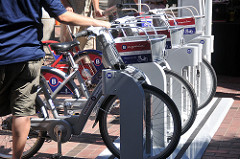Seeking to help boost enthusiasm and raise operating funds for our forthcoming bike share system, the leader of the Bicycle Transportation Alliance, Rob Sadowsky, has joined forces with four other partners to form Portland Bike Share Incorporated (PBSI).
The other founding members of this new non-profit organization include car-sharing expert (currently working with Getaround) Steve Gutmann, the executive director of Portland Streetcar Inc. Rick Gustafson, citizen activist and Portland Planning Commissioner Chris Smith, and Rob Bennett, the executive director of the Portland Sustainability Institute.
“If you look at it form an advocacy perspective, the fact that we’re inside and doing this contract work, I think gives a lot of confidence that the system is going to be delivered well.”
— Rob Sadowsky, Bicycle Transportation Alliance
We hinted at this partnership a year ago, but now it has been formalized.
In a recent member newsletter, the BTA wrote that they’ve launched PBSI to, “help build political and financial support for the [bike share] system” and that the move would, “generate revenue for the BTA and be an exciting new project in our portfolio.”
Reached on the phone this morning, Sadowsky said the idea to form a non-profit came from Rick Gustafson, whose Portland Streetcar Inc., will serve as a model for the new organization. (Note: Partners in the new non-profit are representing themselves, not necessarily the companies and organizations they work for.)
PBSI is formally named as a partner in the Portland bike share system application of Alta Bicycle Share (a local company that is the leading bike share operator in the U.S. and is expected to be a strong candidate for Portland’s system). However, Sadowsky said they will look to partner and assist whichever vendor ends up winning the Portland contract.
Sadowsky says his organization contemplated being directly involved as a bidder for Portland’s bike share system, but “decided it would be best for us not to be involved.” He likened the new non-profit to a booster organization that will work both as a cheerleader and an outside advisor for the eventual bike share vendor. “Our goal will be to build a broad base of political and financial support for the system,” he said. The group would also help form a coalition of advisors for bike share that could include representatives from the Portland Police Bureau, TriMet, Metro, and other local jurisdications and agencies.
As for the extent of BTA’s involvement once a vendor is named, Sadowsky says, “Organizationally, we want to see where things lie.” The BTA could, he said, end up being in a contractor role after a vendor is selected to do things like facilitate a public process to determine the best locations for rental kiosks or in helping create and deploy safety messages once the system is up and running. Sadowsky says the BTA has no interest in being involved in the day-to-day management.
Asked about potential conflicts of interest, Sadowsky said he sees no reason for alarm. “There is a clear self-interest, but we are clear and confident it is not violating any legal or ethical conflict of interest.” Is it possible for the BTA to be independent and critical of the City if necessary, while they are so closely tied to business partnerships and contracts? Sadowsky said they are already heavily involved as a contractor for Safe Routes to School and he sees this as a similar arrangement. He said they keep staff working on contracts separate from staff that testify at hearings on projects and funding issues.
For Sadowsky, being proactive around the bike share system is a way to help make the end product better and a way to increase revenue for the BTA:
“If you look at it form an advocacy perspective, the fact that we’re inside and doing this contract work, I think gives a lot of confidence that the system is going to be delivered well. On the other good side, I’m now generating revenue for additional advocacy. That’s just part of doing business in 2012. Contract work is such an integral part of our revenue model and there’s just not enough dollars from membership dues to sustain our work.”
The City of Portland released the request for proposals for our bike share system last month and applications are due by May 25th. The system is expected to be fully operational by April 2013.


